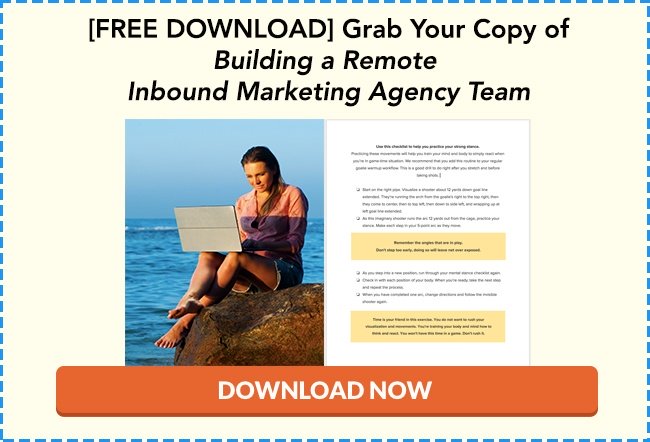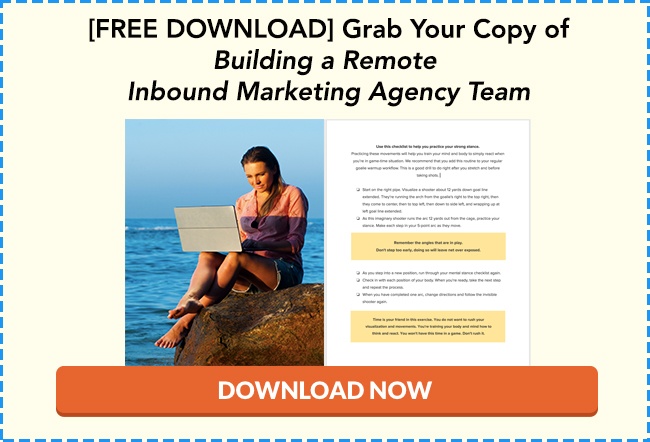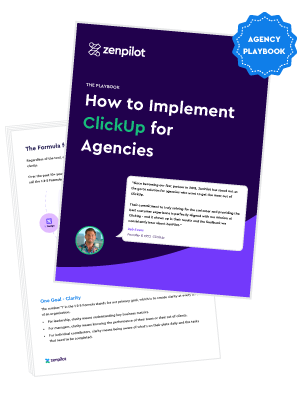How to Build a Remote Marketing Agency Team

Today’s guest, Ryan Malone, is the CEO and founder of Smart Bug, an inbound marketing agency and Diamond-Tier HubSpot Partner. In this episode of Inbound Agency Journey, Ryan shares his personal background, agency story, growth and culture tips, and advice for agency owners.

Creating a Virtual Company (Before It Was Hip)
Prior to starting Smart Bug in 2007, Ryan spent time at several large corporations and venture-backed firms. During his corporate tenure, his experience with marketing agencies and work-life balance led him to believe in and pursue a better solution — through starting his own agency.
Though the beginning steps were small, he had a clear vision of what he wanted for himself and for everyone else on his team. Ryan wanted to work with high-quality people both internally and client-side, in an environment of mutual respect, and maintain the ability for every team member to have a meaningful life outside of his work.
That was the vision from the beginning of Smart Bug and it is that mindset that has driven his success.
These values also drove the decision to operate Smart Bug as a virtual company from the start. The remote structure allows team members to have the freedom to pursue their interests, goals, and dreams.
Today, Smart Bug has 25 remote team members and is continuing to grow. It’s an inspiring story and Smart Bug is in a great position for ongoing growth, but it hasn’t all been easy and there are constant challenges at any stage of an agency.
How Do They Make It Work?
One of the key factors that holds the virtual team together is the fact that every team member is a full-time employee. Ryan believes that in order to create a family-like culture, you have to “treat people like family.” Instead of operating as a team of independent contractors, every Smart Bug team member receives the paycheck, benefits, and W-2 that they would if they worked on-site at an in-person agency.
Communication is always critical, but operating remotely presents another layer of connection challenges. Smart Bug overcomes this by consistently making time every week to connect. Their staff meetings all happen over video chat and they have a lot of fun doing it! These sessions are not entirely about the ins-and-outs of client work and internal operations, but are also about building the interpersonal relationships within the team.
It’s easier to operate remotely when your employees can get together in person throughout the year, they feel cared for, and communication is open and honest. Every year, Ryan brings the whole team together for a social gathering.
How to Make (Any) Team Work Well
Investing time and money into getting to know your people is a necessary component of a tight-knit culture. Your employees need to feel and see that you care about them and that you’re invested in their success. As an agency owner, you can demonstrate that by seeing team members as much as possible and always treating them with respect.
Compensation and benefits are definitely important, but growth opportunities are equally critical. Hiring smart, motivated people who share the core values of your team is the necessary first step.
Although he isn’t sure how operating a team of 50 people will work, Ryan is prepared and excited to find out. Smart Bug is still growing and Ryan is confident that their remote system will keep working for them.
When & Where Does HubSpot Fit In?
In 2005, Ryan’s mom had a stroke. Through that experience and what he learned, Ryan wrote a book on getting the most out of the senior housing service. The book was picked up by two of the biggest providers in the market who subsequently became Ryan’s first two clients.
From 2007 to 2009, Smart Bug focused on general marketing consulting. As Ryan started doing traditional demand consulting, he realized that all the agencies had the same problem. They were spending a lot of time attempting to connect data from a lot of different tools together using Excel. Every month, the insights were different and agencies could easily fudge the numbers to make themselves look good.
After looking at several platforms to help solve this pain, Ryan determined that HubSpot was the way to go based on their roadmap, technical background, and solid investor base.
Like so many successful agencies, Smart Bug initially used HubSpot for themselves. Once Ryan’s team was up-to-speed on the tools and seeing results, they started to implement HubSpot for their customers.
The data captured in HubSpot soon became Smart Bug’s best friend. Ryan points out that the data has to become an extension of your team. There is nowhere to hide in this data, so when problems come up you have to look at them and find a solution. This is a much healthier option for your client.

The Benefits of Process for a Remote Team
One of the most compelling reasons to run a distributed team is that you can hire better people because you’re not constrained to a small geographic radius.
As Smart Bug added new clients accounts and continuously improved their system and processes, they documented their playbook. Then they would hire the best person they could find and “let them do what they know how to do.”
Smart Bug focuses a lot on process. Ryan’s goal isn’t to have a bunch of creative people just spit-balling ideas on white boards. Instead, creativity is one of the steps of the process. You have to invest in systems, people, and process to be profitable.
One of the ways the Smart Bug system works so well is with its new hires. Smart Bug doesn’t tell a junior person to go and watch all the Hubspot academy stuff. That’s simply not enough to teach them to be effective. Instead, Ryan uses the old apprentice model.
New employees start with basic things (like blogging and blog management). Initial training will be focused on how to use HubSpot for that process. Then they focus on how they (Smart Bug) perform these tasks. When the new team member is fully prepared, they begin working on accounts. It’s a training process that’s well-guided and gets new people up to speed quickly. The result is they don’t have to do as much retraining as many agencies.
Every deliverable at Smart Bug has a process behind it. This process ensures that the little things that make a difference between a good campaign and a really great campaign happen every time. Smart Bug spends a lot of time making sure these processes are perfect. New hires are brought up to speed by a real person. Then they have a well-documented fall back process that reinforces what they learn. The system allows people to grow and be effective really quickly.
The Culture of Smart Bug
Smart Bug is trying to build an environment that makes people want to stay forever. They want it to be the best career story their team members ever had.
Smart Bug is a place to work with great people and do really great work. It’s a place where for continuous improvement and growth. It’s also a place where employees are encouraged to “have a life.” They shut down their PC’s and log off at a reasonable time of day — part of what makes them great people is that they have interests, families, and lives of their own.
The employee’s side of the agreement requires that they are completely transparent. Transparent about what they need to be successful. They communicate what skills they need to develop to be more effective. They hit dates and do what’s right for the client, even if it means spending more. If what the client needs is outside of scope it doesn’t matter. As long as it’s the right thing for the client, they make it happen.
The Inbound Marketing Agency Hiring Process
Smart Bug is always interviewing. They don’t wait for a position to open before they start looking for someone. Instead, they talk to potential team members all the time so that when a position opens up they already have one or two people in mind.
Many of the leads for new team members come through referrals from existing team members. They also have a careers section on the Smart Bug website where prospective employees can express their interest, and they also use some of the job-posting sites and services.
Once the resumé is in, if someone looks like a good match, Ryan will spend half an hour talking to them, usually on video chat. This gives him a chance to see if they are a good fit and if the company will be a good fit for them.
The next stage is one-on-one video interviews with four of the Smart Bug team members. Who does the interviewing depends on which team the candidate is for. Rather than asking the usual career history questions, Smart Bug will ask them things like: Why do you want to be here? While skills and technical competency are necessary, the interviewers focus on questions that determine cultural-fit, since much of the technical background can be seen on the resumé.
These interviews with the team members happen one-on-one because you want the interviewee to feel a connection with the interviewer. People don’t respond the same way in front of a team as they do talking to just one person at a time.
If everyone on the panel agrees that the prospective employee is a good fit for an open position, Smart Bug makes an offer, agrees on terms, and then the on-boarding begins!
Advice for Young (or New) Agency Owners
You have to differentiate yourself from all the other people on HubSpot. Look at where you want to take your company and use the skills that will get you there. Whatever doesn’t work for you, leave it behind.
You work for your customers. Your goal is to make them win. Focus on the results they have, even if you have to go out of your way. At the end of the day you will have bigger retainers and more trust from your customers.
Don’t be cheap.
Invest in your team, invest in your infrastructure. Don’t do things that erode the trust in your company. You have to trust the people you hire. Find good people, spend a bit of money on them, help them grow, and invest in them.
If you would like to get a hold of Ryan, you can check out Smart Bug’s website at smartbugmedia.com or email him directly at ryan@smartbugmedia.com.





